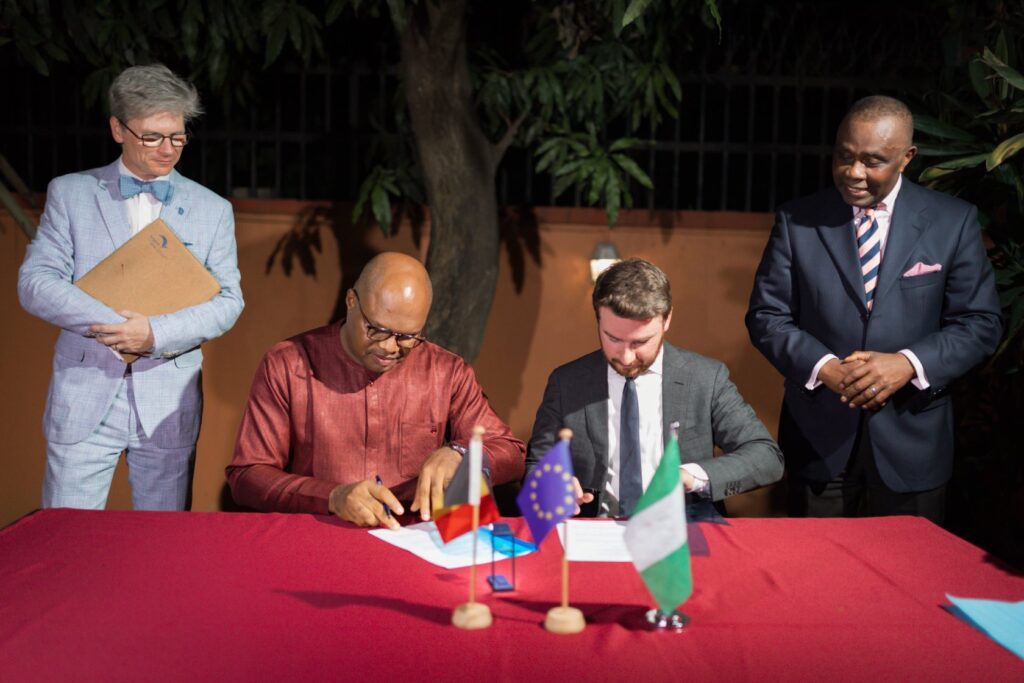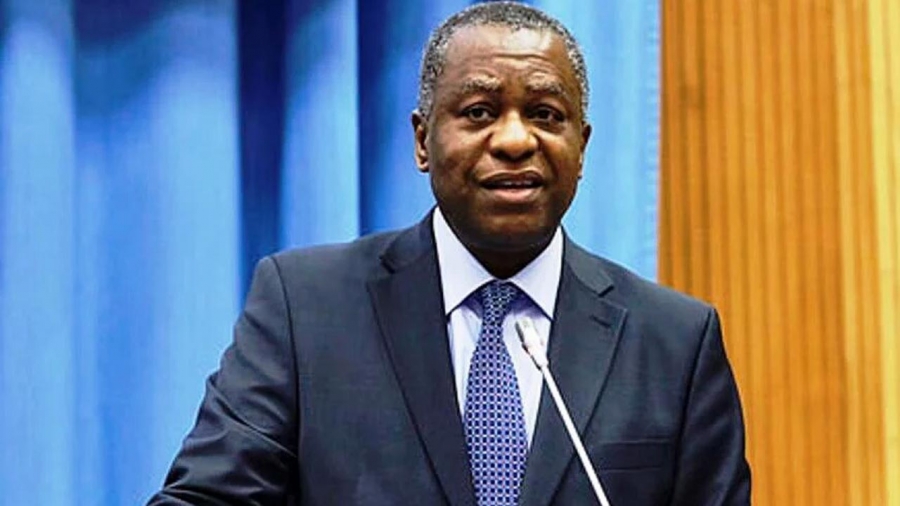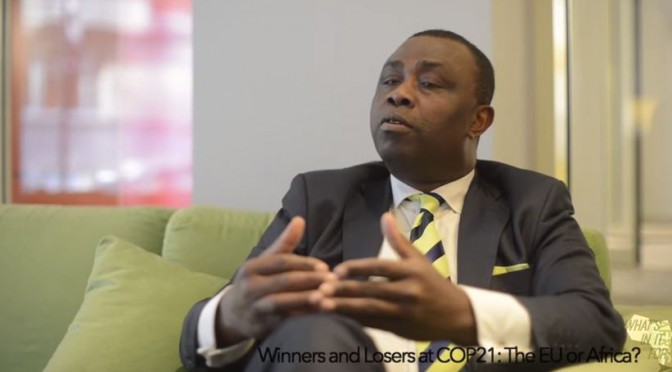In this extensive duo conversation, Secretary General of CBL-ACP Chamber of Commerce, Thomas De Beule and I were engaged by journalist Stephen Imediegwu of RadioNow FM Lagos. Within the framework of a mission to Nigeria to unveil and promote the 2nd Nigeria Belgium Luxembourg Business Forum, holding in Brussels, Belgium on 18 – 20 September 2024, we sought to speak to the notion of Oil been a dead commodity.
Tag: Nigeria Economic Diplomacy Initiative
The Diaspora as Drivers of Service Export for Nigeria
In this conversation with TVC Breakfast anchored on my policy recommendation for an organised service export for Nigeria, I highlighted the Diaspora component of Nigeria’s current Renewed 4D Foreign Policy doctrine as providing the required framework.
Belgian listening ears to Nigerian Investors and Innovators

There is much more than meets the eye at first sight, and our trade statistics are not telling the whole story. What is Belgium doing in and for Nigeria? Two fresh stories from the last two months provide excellent examples of it. – Amb. Pieter Leenbregt
Full text of: WELCOME REMARKS BY HIS EXCELLENCY AMBASSADOR PIETER LEENBREGT AT THE ABUJA BUSINESS RECEPTION TO UNVEIL THE 2024 NIGERIA BELGIUM LUXEMBOURG BUSINESS FORUM
Your Excellency Uba Maigari Ahmadu, Honorable Minister of State for Steel Development,
Honorable Adamu Saba, Chairman of the Parliamentary Friendship Group Nigeria-Belgium at the National Assembly,
Honorable Members of the same Friendship Group,
Honorable Tochukwu Okere, Chairman of the House Committee on Diaspora Affairs at the National Assembly,
Excellencies, Colleagues members of the diplomatic corps,
Dear businesspeople,
Esteemed members of the press corps,
Ladies and gentlemen,
The Belgian Embassy in Nigeria warmly welcomes the representatives of the Chamber of Commerce between Belgium, Luxembourg and the African, Caribbean and Pacific countries – CBL ACP – and its partners and sponsors for tonight.
We rejoice in the prospect of a Nigeria Belgium Luxembourg Business Forum to be held from 18 to 20 September in Brussels and will gladly hear out Thomas De Beule about the CBL ACP plans in that regards. As you may know, Belgium does not only host most of the EU institutions on its soil but is currently also holding the rotating presidency of the EU Council, until end of June this year. This means lots of additional VIP travel between Belgium and Nigeria. And it is only befitting that the EU’s Business Forum in Abuja and your Business Forum focused on Nigeria in Brussels are organized with only the summer holidays in between them both – almost back-to-back, one could say.
We were always very enchanted with the strong business focus in the work of the immediate past Nigerian ambassador Obinna Onowu in Brussels and are hopeful that his successor will put an equal emphasis on it. From the point of view of our Embassy, too, things are crystal-clear in this regard: Nigeria is not so much a partner country for development cooperation as so many other ones in the sub-region; it is a middle-income country open for and eager to do business.
There is much more than meets the eye at first sight, and our trade statistics are not telling the whole story. What is Belgium doing in and for Nigeria? Two fresh stories from the last two months provide excellent examples of it.
One month before the EU and Nigeria signed a deal worth 18 million euro to boost vaccines production in Nigeria, and in the sidelines of a Ministerial level event on Health Sovereignty in Africa organized by the Belgian EU presidency in the Egmont Palace in Brussels, the Belgian company Univercells signed a Memorandum of Understanding with the Minister of Health, HE Muhammad Ali Pate. Their ultimate goal is to save more lives and provide affordable healthcare for all Nigerians. An ensuing action plan will now focus on the production in Nigeria of MRNA type vaccines against Lassa fever, and on training local capacity. Developing MRNA vaccines in Nigeria was mentioned by Minister for Foreign Affairs Tuggar as one of the six big priority areas in the collaboration between Europe and Nigeria – and a Belgian SME knows how to unpack this. With revolutionary business practices and scientific methods, they also know how to bring down the dimensions of a production facility from a classic big factory building to something the size of a classroom.
Example number two, now: two weeks after the EU and Nigeria celebrated Zero Waste Day together in Abuja, we received word that a Brussels-based company, Haemers Technologies, was identified by HYPREP, the Nigerian agency in charge of remediation for the oil pollution in the Niger Delta, as the ideal partner to be part of the clean-up there. With its thermal desorption techniques, Haemers Technologies also caught the attention of the Vietnamese government in combating the harmful effects of Agent Orange dropped by the US army during the war in the sixties and seventies. After a technology tour in three countries, HYPREP and the Nigerian Ministry of the Environment got convinced that the Belgian SME can enable them to “deploy the best innovative technology that can be found globally”.
If all goes smoothly, a contract will be signed in a matter of weeks from now. The clean-up will finally bring justice to the Ogoni people decades after their land got contaminated by oil majors, and after Ken Saro-Wiwa and his friends, during the Sani Abacha dictatorship era, paid with their lives for their engagement to the cause of reparation. It will also implement a UN assessment report on how to deal with the oil spills, more than a decade after it was drafted. And, as in the case of Univercells, training local people and transferring knowledge and technology will be central to Haemers’ endeavors.
On a more business-to-business level, we welcomed in Lagos in late January a very self-organized, compact trade mission of eight Belgian companies around Vyncke, specialized in waste solutions, renewable energy generation, water treatment and food storage and processing. May many more of them find the way to Nigeria.
Meanwhile, after the Covid lull, the activity of various relevant Chambers of Commerce has notably picked up again between our countries. Both Eurocham and the Nigerian Belgian Chamber of Commerce are programming interesting activities this year and are keeping a listening ear to the needs of our actual and potential investors and innovators in Nigeria. And right here, this evening, the Belgian-Luxembourg-ACP Chamber will sign an MoU with the Abuja Chamber of Commerce and Industry. We are looking forward to ever more such engagements and interactions.
During the past three days, Brussels hosted the World Cocoa Conference, and an exchange of expertise between government experts from cocoa producing countries will be organized in the wake of it in June, by our Ministry’s think tank the Egmont Institute. As with the past Conference, Nigerian participants are keenly invited.
To paraphrase both presidents Barack Obama and Bola Tinubu: Belgian companies come to Nigeria with the audacity of renewed hope, and vice versa. Here’s wishing for many hopeful and promising chapters indeed!
Economic Diplomacy & the Diaspora
I was delighted to have made a presentation at a Multi-sectoral Stakeholders Economic Investment Summit organised bySME Secretariat and hosted at the Lagos Chamber of Commerce, Victoria Island, Lagos Nigeria on Monday 21 January 2019

I used the opportunity to review the Nigerian Economic Diplomacy Initiative (NEDI) of the Ministry of Foreign Affairs of Nigeria under President Muhammadu Buhari. After a general refresher of what NEDI is all about, I dropped the following conclusions on this policy initiative:
- NEDI is a strategically important policy tool with huge potentials to make a structural difference in economic regeneration of Nigeria with focus on non-oil sector
- NEDI made a good start but has clearly not lived up to its biddings. It has failed rather woefully in showing evidence that it has made a convincing start in delivering on the important task of enhancing inter-agency collaborations
- There is no visible effort on the part of NEDI to genuinely engage the Diaspora in a result-oriented way
- Unless there is a change of course, NEDI is marked to fail!
I wrapped up with these sets of recommendations:
- Foreign trade component should be introduced into the operations of all Ministries, Departments & Agencies (MDAs)
- A NEDI Attaché should have a sitting in all major Missions of Nigeria worldwide where possible or the role unambiguously integrated into the duties of all diplomats charged with economic affairs
- A formal working relationship should be initiated with Nigerians in Diaspora Organisation (NIDO) worldwide to enhance professional Diaspora mobilization
- Clear targets should be set for inward investment flows as aconsequence of NEDI activities
Access to the integral PowerPoint Presentation on Economic Diplomacy & the Diaspora is possible:https://1drv.ms/p/s!AuyRKnHzz067wRMWQFFnd28yiaXL
